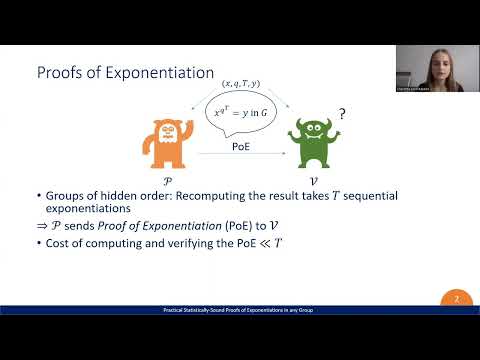CryptoDB
Practical Statistically-Sound Proofs of Exponentiation in any Group
| Authors: |
|
|---|---|
| Download: | |
| Presentation: | Slides |
| Conference: | CRYPTO 2022 |
| Abstract: | A proof of exponentiation (PoE) in a group G of unknown order allows a prover to convince a verifier that a tuple (x, q, T, y) ∈G × N × N × G satisfies x^q^T= y. This primitive has recently found exciting applications in the constructions of verifiable delay functions and succinct arguments of knowledge. The most practical PoEs only achieve soundness either under computational assumptions, i.e., they are arguments (Wesolowski, Journal of Cryptology 2020), or in groups that come with the promise of not having any small subgroups (Pietrzak, ITCS 2019). The only statistically-sound PoE in general groups of unknown order is due to Block et al. (CRYPTO 2021), and can be seen as an elaborate parallel repetition of Pietrzak’s PoE: to achieve λ bits of security, say λ = 80, the number of repetitions required (and thus the blow-up in communication) is as large as λ. In this work we propose a statistically-sound PoE for the case where the exponent q is the product of all primes up to some bound B. We show that, in this case, it suffices to run only λ/ log(B) parallel instances of Pietrzak’s PoE, which reduces the concrete proof-size compared to Block et al. by an order of magnitude. Furthermore, we show that in the known applications where PoEs are used as a building block such structured exponents are viable. Finally, we also discuss batching of our PoE, showing that many proofs (for the same G and q but different x and T) can be batched by adding only a single element to the proof per additional statement. |
Video from CRYPTO 2022
BibTeX
@inproceedings{crypto-2022-32201,
title={Practical Statistically-Sound Proofs of Exponentiation in any Group},
publisher={Springer-Verlag},
author={Charlotte Hoffmann and Pavel Hubáček and Chethan Kamath and Karen Klein and Krzysztof Pietrzak},
year=2022
}

